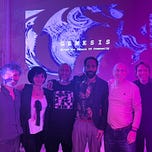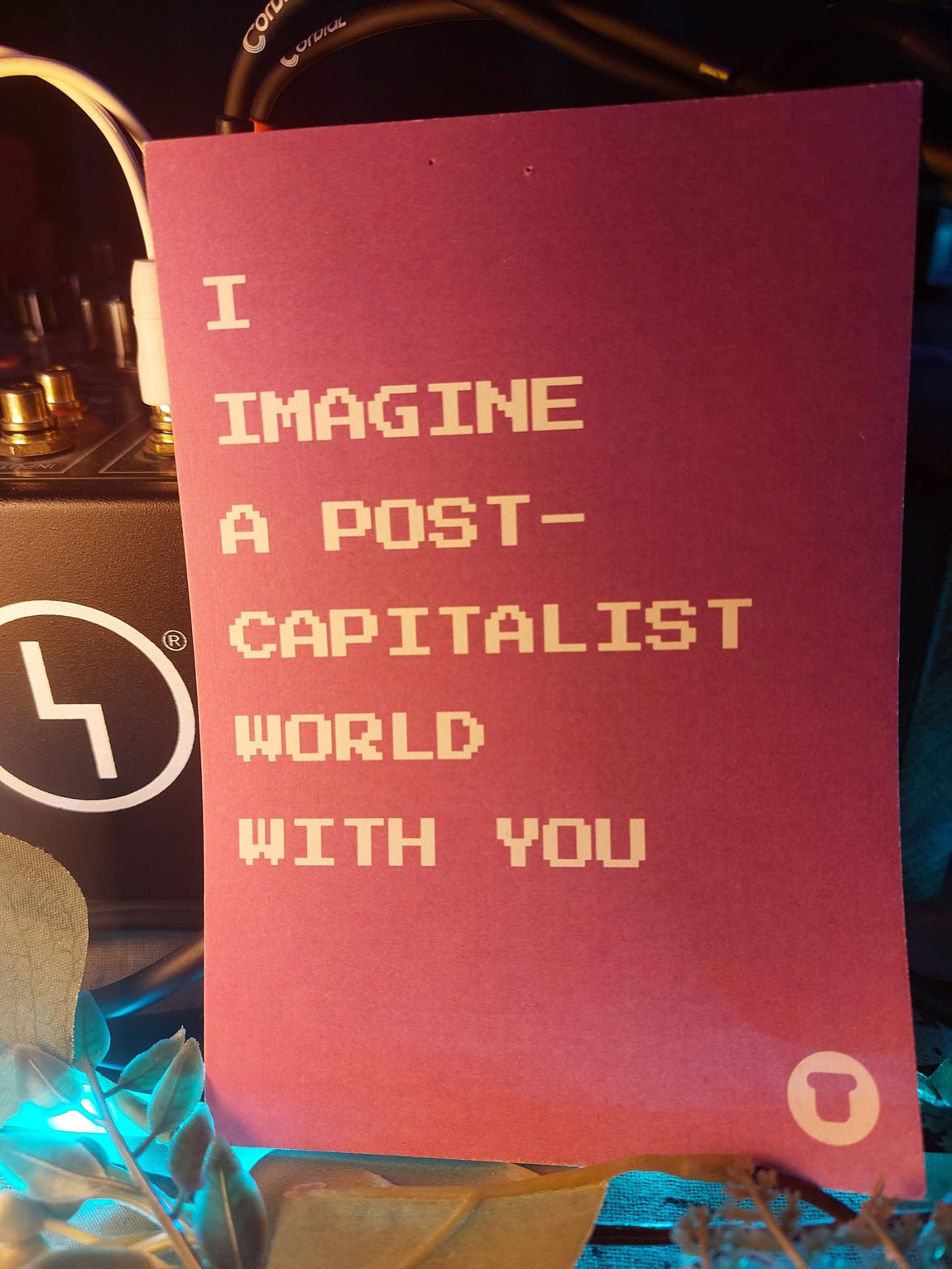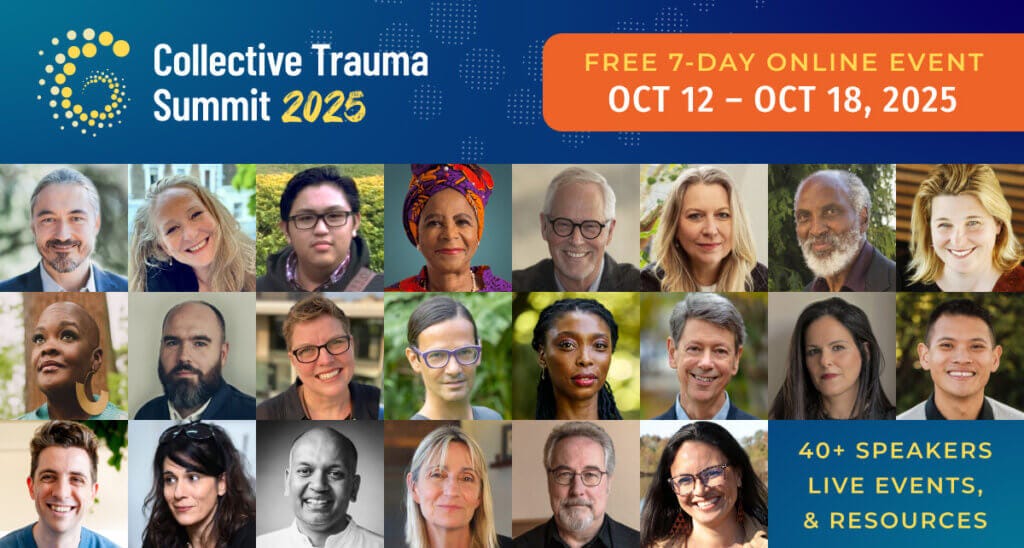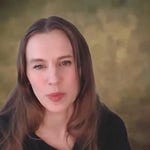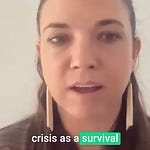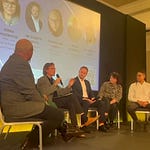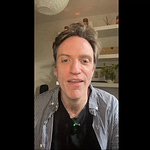Thank you for reading Resonant World 🙏.
Resonant Notices: Healing for Gaza is looking for psychotherapists, psychologists, psychiatrists, or psychiatric nurse practitioners who wish to dedicate several hours per week to supporting the mental health of children, adults and front-liners in need, apply here.

Resonant World #159
It was the kind of gathering I love.
And also the kind that’s hard to sum up in a few words.
People grappling with civilisation-scale questions — not in the expectation of finding “answers,” but at least embodying a willingness to confront uncomfortable truths. A commitment to cultivating a continual awareness of the energy arising between the participants and to tend to this field in real time. An opportunity to actively practice slowing down and speaking from the heart.
This was the Genesis Experience, expertly co-facilitated by Timothée Brès and Pamela von Sablar, friends of Resonant World, which gathered about 40 people engaged in various forms of systems thinking, philosophy, digital innovation, activism, group facilitation, consciousness exploration and other fields at the Commons Hub Brussels last weekend.
The over-arching intention was to explore “new cultural operating systems” suited to responding to the many facets of the metacrisis — whether we approach our predicament through the lens of the crisis of capitalism and the environment, masculine-feminine polarities, or tensions between conservative and progressive worldviews.
I’d felt a strong pull to attend — keen to both explore the role that collective healing practices might play in responding to these questions, and also to share the work of the
, the international men’s initiative I co-founded with . (More on Resonant Man here).I’m not going to attempt to offer a comprehensive summary of what was discussed, or quote from everybody who spoke. But I thought I’d share a few notes for those who might have been intrigued after reading about the event on Resonant World ahead of time to give a flavour of the themes we explored:
Reviving the concept of the “commons” — which can be defined as “things that we all own together, that are neither privately owned, nor managed by the government on our behalf” — to act as a counterweight to the growing crisis of unfettered and rigged global capitalism.
Obvious examples of commons have traditionally included pastureland or oceans, but the idea of the commons can be extended to the air we breathe, or democracy itself. (From a collective healing perspective, we might even broaden the concept of the commons to include our collective consciousness, or “psychosphere” — where both our shared ancestral resources, and collective and inter-generational trauma, reside).
In a sweeping historical overview,
of , noted that 400 years of capitalism had gutted the institutions that manage the commons and that the West had thus “lost its capacity to care for the common good.”Michel also offered an inspiring vision of the potential for an “archipelago of regenerative projects” to emerge through a form of “cosmolocalism” supported by transnational digital organising. (I was reminded of
and ’s explorations of cosmolocalism in The Alternative UK).There was a vibrant discussion of both successes and constraints in organising commons-style housing initiatives in Europe, including from Maxim Zaït, co-founder of Cobha (a housing cooperative in Brussels), and blockchain researcher and author Primavera De Filippi. Ronald Jean-Toussaint spoke about the “resonance of the commons” the following day.
- of Philosophy Portal elaborated on the themes in his epic July essay exploring the polarities between left and right through the prism of the struggle between Reform and Labour in the UK. Cadell spoke about how the leaders of the right-wing populist surge organised around immigration and nativism and advocates of a growing left-wing populist surge organised around inequality and taxation are essentially talking past each other. The question from Cadell: How can we develop a discourse that responds meaningfully to the concerns of left and right by addressing both migration and inequality? Without this kind of integrated discourse, the right-left polarity is only likely to intensify.
It was also great to connect with
, , , Göran Hielscher and many others.
We explored a lot more over the two days — but if I could take just a couple of the questions that emerged during the gathering home with me, it would be these provocations from Pamela:
“What is the future story that we’re telling? What is the spark we’re giving to the next generations?”
Sensing Into the Field
I also learned a lot from how Pamela modelled ways to support a group of people to develop an increasingly coherent shared awareness over two days. Here are some of my notes, which I took to support my own development as a facilitator:
In her role as “conductor,” Pamela was able to support participants to attend to “contractions” in the group field (moments of tension or intensity) and also celebrate “expansions” (moment of insight, connectedness), and to notice how they affected our own individual capacity to hold complexity.
Bringing the “not knowing” into the room.
If triggered by what somebody said, find a moment to explore what they said with them in more depth later.
Before speaking, check-in to discern if the impulse is coming from a desire to hear your own voice, or genuinely to contribute to the whole.
Returning continuously to the question of how far we could feel a spark of “aliveness” in the room (and what happens when we follow it)?
For more on Pamela’s amazing “Living Eros” work, do tune in to the conversation we published on the Resonant World podcast in March.
I was also grateful to Timothée for inviting me to share a perspective from the collective healing training I’ve been pursuing with Thomas Hübl over the past four years (clip above). I received some warm resonance from others who were intrigued about how collective trauma integration work might support their own projects.1
Museum of Consciousness
Finally, no account of the weekend would be complete without a reference to the Museum of Consciousness, a mind-expanding sonic transmission presented by Carl Hayden Smith, whose work on “hyperhumanism” emphasises becoming more human (as opposed to post- or transhuman in this age of accelerationist AI). Suffice to say, I was transported to the inter-galactic foundries where an alien civilisation manufactures its starships, by way of the King’s Chamber in the Great Pyramid. At some point, I landed in a forest of fluorescent mushrooms and singing vines. If you ever have an opportunity to experience the Museum of Consciousness, I highly recommend the experience — which changed the way I think about the healing power of sound.
If this post speaks to you, please consider exploring What Is Collective Healing? a weekly podcast I co-host on behalf of the Pocket Project, produced by J’aime Rothbard.
Collective Trauma Summit 2025
The Collective Trauma Summit is back — running from Sunday October 12 to Saturday October 18. Register for this inspiring event here.
For more on this topic, see the paper Healing Systems: How recognizing trauma in ourselves, other people, and the systems around us can open up new pathways to solving social problems. Covered in Resonant World #69: Forward this When Words Fail.


